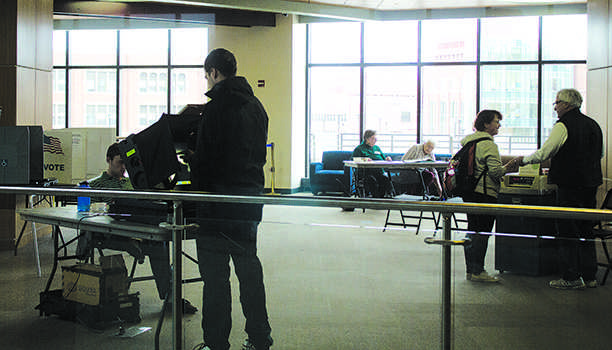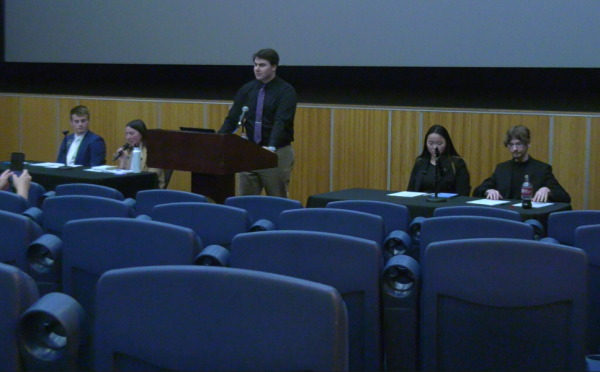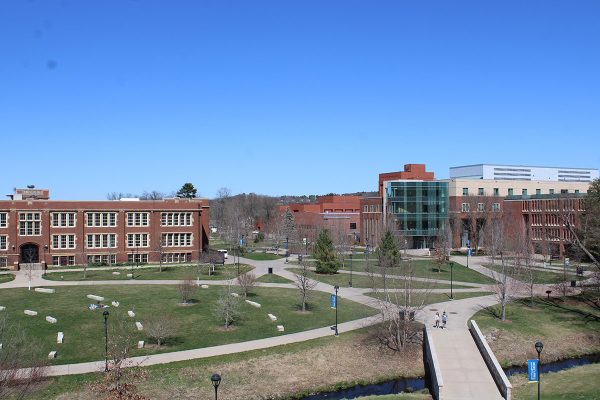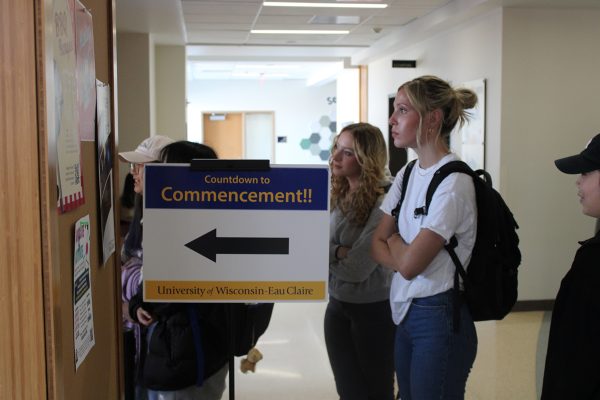Confluence collects city and county support
City Council will continue to work on large and small projects that affect students
ROCK THE VOTE: Students who live on campus voted in Davies Center Tuesday for City Council president and a referendum about the Confluence Project, among other things. © 2014 Elizabeth Jackson
April 2, 2014
Voters in the city and county of Eau Claire made two decisions Tuesday that could have a significant effect on the future of UW-Eau Claire and its students.
Two Confluence Project-related referenda asked voters if the city should hold future public polls before spending $1 million on fines arts facilities, and the county asked if it should pledge $3.5 million to the proposed downtown arts center.
Voters declined the city referendum and approved the county’s, which signals support for the Confluence Project.
Incumbent Kerry Kincaid also beat challenger councilmember Monica Lewis to secure her third term as City Council President.
“It’s not often thought of, but (City Council sets) in place all of the ordinances that direct your life while you live in Eau Claire,” Kincaid said.
In coming years, Confluence Project conversations will have an effect on students, but Kincaid said things like parking, housing and transit are all ways city council decisions affect students’ lives.
Kincaid said the Confluence Project must clear local and statewide hurdles. The city will work with developers on a land-use agreement and private donors need to raise $12 million for a $50 million fine arts building and $28 million for a multi-use building which will hold retail space and student housing.
“Students will be more of an integral part of downtown, will add to the excitement and energy and connections students feel with citizens and citizens feel with students,” Kincaid said.
Lewis said last night was Eau Claire citizens’ chance to stand up and be counted, which is what the referendum committee always wanted.
“With the vote the way it is, the Confluence Project can go to Madison, go to potential contributors and say our citizens do want this,” Lewis said.
Based on numbers provided by Janet Loomis, Eau Claire county clerk, approximately 1,700 people voted in the wards primarily populated by students. Students made up about 8 percent of voters, with 21,589 people voting county-wide.
Executive Director of the Eau Claire Regional Arts Center Ben Richgruber said he thought student voter numbers were higher this year than in past spring elections.
“Sometimes it’s easy for people to think that the students aren’t part of this community,” Richgruber said. “You come to town, you do your school, you get out. But I think that has changed and I think the fact that so many students are choosing to be involved locally is a really strong statement about the character of UW-Eau Claire.”
Richgruber said he credits the Confluence Project with getting the student voters out yesterday and said they can continue to stay involved with the project by making small donations when possible and getting their friends involved.
He said the project is a great asset for university, which he said already has a great music program. It will great recruiting tool for university, great educational opportunity for students who will use it in the future, he said.
“Hopefully, it will encourage all of you to stick around town when you graduate and not run off to find your fame and fortune somewhere else, because you’ll be able to find it here,” Richgruber said.
Kincaid said City Council is always working on things that affect students. She said the relationship between City Council and students is a two-way street. Ordinances passed in City Council affect student housing, parking, the transit system and our athletic fields and the university invites City Council to use the Davies Center for some events. She said there’s also lots of collaboration with students having internships in city hall.
“Our relationship is very intertwined,” Kincaid said. “I think there’s no reason to consider it won’t just continue to get better.”
City Council is involved in a project to update Carson Park and recently placed a student on the transit commission to help improve the bus routes, Kincaid said.
Around 300 people, most of them students, voted in Davies Center on Tuesday. Sophomore Jake Whitstone said he voted because the Confluence Project is important to him.
“I’m really interested in being civically engaged,” Whitstone said. “(The Confluence Project) directly affects Eau Claire and future generations.
It’s kind of like a legacy thing. I want to make Eau Claire better than when I came to it originally.”
Sophomore Jake Wrasse said there’s more to consider than just the Confluence Project.
“The effectiveness with which the city council is run is very important to students whether it’s things like crosswalks or residency issues, the city council does play a major role in the things that the students face in their time here,” he said.
Lewis said there’s nothing specific right now in the City Council to address some student-centered issues like parking, but that doesn’t mean someone couldn’t bring something forward.
“We always try and we do want the students to be engaged in local politics,” Lewis said. “They live here and a lot of what we provide in this community helps students and we want them to be comfortable here.”











